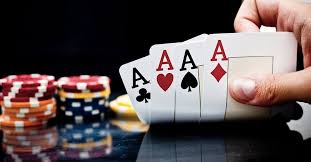Should Gambling be Illegal? – Alex Gray

Gambling is an age-old tradition, with evidence showing its origins in the Palaeolithic era, before written history, as archaeologists discovered the first 6-sided dice as dating back to as far as 3000 BC. From this, alongside common practice of betting on animal fights in ancient China, it could be inferred that gambling, and more specifically our psychological fascination with chance and luck, is simply wired in mankind’s disposition. However, despite this inherent attraction to gambling it is something many countries, states and religions have enforced a ban upon, with the question I ask being whether or not such restrictions are justified?
Despite its evident negative stigma, gambling is not without its positives, the majority of which, however, come attached with an economic pay off to a social cost. Gambling is often used to raise money for the state or good causes. Many governments tax gambling, some even run their own lotteries; alongside charities using prize draws to raise funds. Evidence of this is the UK national lottery, which helped to raise £41 billion in the name of good causes. This comes alongside the more standard benefits of employment, greater tax revenue, and growth in local retail sales around areas with casinos.
Furthermore, in contrast to the extensive issues caused by addiction, a study conducted by the Behaviour analysis and therapy program at Southern Illinois University concluded gambling positively improves your mood and happiness. The study showed that the level of happiness, shown by increased stimulation in the frontal cortex, in individuals rose while they were engaged in gambling activities. When compared with those who used television as a source of entertainment, the individuals who gambled were happier. However, the worrying side of this study showed that those who partook and engaged in gambling consistently showed similar brain activity to those of alcoholics at the sight of drink and opioid users at the sight of heroin, arguably reflecting its addictive and harmful qualities.
In contrast to the University’s debatable study, I’m sure you are all well aware of its obvious harmful effects, which wear down to the very essence of the way in which casinos are constructed and the accessibility of online gambling. Subliminal messages can be found all throughout casinos to keep you excited about the possibility of winning. You can find posters displaying pictures of smiling players with their winnings as well as signs for a high-rollers’ lounge, and the words “jackpot” and “win” are posted hundreds of times in a casino. These casinos create a winning atmosphere that you would want to be a part of. This alongside, in some places, free drinks and lack of windows are designed to keep those who are gambling engaged, exploiting the aforementioned human fascination with chance and luck.
It is designs such as these that form both addiction and crippling debt, with a businessman from Nebraska losing $127 million USD in a yearlong streak in Caesars Palace, Las Vegas, in 2007. Two years later, Terrance Watanbe filed a civil suit in Clark County District Court claiming the casino was partly responsible for fuelling his loss streak by providing him free drinks and painkillers and allowing him to gamble when he was clearly intoxicated. Watanbe ultimately provided approximately 5.6 percent of Harrah’s Entertainment Inc., the parent company of the casinos he gambled at, total Las Vegas gambling revenue that year, with his lawyer stating that he was provided with “two to three bottles of vodka a day,” alongside “highly addictive pills, eight or 10 a day, sometimes in a candy box.”
Albeit a highly rare example, Watanbe’s case is a representation of the detrimental effects of the gambling industry, being someone who started out young as a hobby, acquiring a habit that ultimately ruined his life. Does this case alone mean gambling should be banned? I do not think so, people have the liberty to spend their money how they wish. But should gambling be endorsed? Absolutely not. I am sure many of you, and not just myself, have experienced gambling adverts all over media, with the infamous “when the FUN stops, stop” bombarding TV and YouTube ads, respectively. As someone who is not 18 yet this seems both subversive and insurgent, especially amongst far stricter approaches to both alcohol and smoking advertisement.
So, what is my stance upon the matter? Well as the majority of you are under 18 then I strongly advise to steer clear from any involvement whatsoever, its illegal. But past that, I believe it is your own choice, and not something that should be banned. I think that here it would be fitting to add the disclaimer that I do NOT endorse gambling, it is simply my judgment and opinion that despite its addictive qualities and negative effects that people have the liberty to engage in such ‘entertainment’ to their own will and not something that should be restricted but instead highly regulated.















Post Comment
You must be logged in to post a comment.